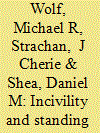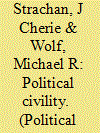| Srl | Item |
| 1 |
ID:
117577


|
|
|
|
|
| Publication |
2012.
|
| Summary/Abstract |
Political observers have detected a noticeable uptick in American political incivility in recent years, culminating with several moderate senators recently citing the rise of hard-core partisanship as the reason for their retirement. Supporting these accusations of unprecedented incivility with empirical evidence can be difficult, as notions of what constitutes appropriate, civil behavior are subjective and can vary across the political context of different eras. Was it more uncivil, for example, for William Jennings Bryan to accuse his political opponents of crucifying other Americans on a cross of gold than it was for a member of Congress to yell "You lie!" at the president in the nation's Capitol? Assessing the incivility of these statements requires determining the effect each had on political opponents' abilities to maintain a functional relationship despite their disagreement over policy outcomes. Nevertheless, many politicians, political observers, and scholars are truly concerned that current levels of incivility are indeed worse, not only damaging the ability to resolve complex public problems, but threatening the long-term stability of America's governing institutions. Largely focusing on changes in institutional structures and elite behavior, scholars identify numerous explanations for this trend.
|
|
|
|
|
|
|
|
|
|
|
|
|
|
|
|
| 2 |
ID:
117572


|
|
|
|
|
| Publication |
2012.
|
| Summary/Abstract |
The articles in this symposium are peppered with numerous recent incidents of political incivility ranging from physical scuffles at town hall meetings to the now-infamous accusation shouted at president Barack Obama during a nationally televised address before a joint session of Congress. Name calling and ad hominem attacks that were once associated with talk radio and cable television pundits have made their way into the halls of governing institutions, which no longer serve as sacred spaces one-step removed from bare-knuckled politics. Indeed, divisive views have even made inroads into "safe" topics for discussion-the weather and sports. Forget the intensity of debate over climate change. Democrats were actually 10% more likely to claim that the 2012 winter season was warmer than were their Republicans counterparts (Newport 2012). Sports no longer offers a neutral conversation starter, as 27% of Republicans view Tim Tebow as their favorite quarterback compared to only 9% of Democrats (Public Policy Polling 2011). Vitriol, combined with legislative gridlock and the uproar of protestors-not only in Washington, DC, but also in state capitals and prominent cities across the country-has shifted our discipline's attention to the role of political civility in sustaining a healthy democracy.
|
|
|
|
|
|
|
|
|
|
|
|
|
|
|
|